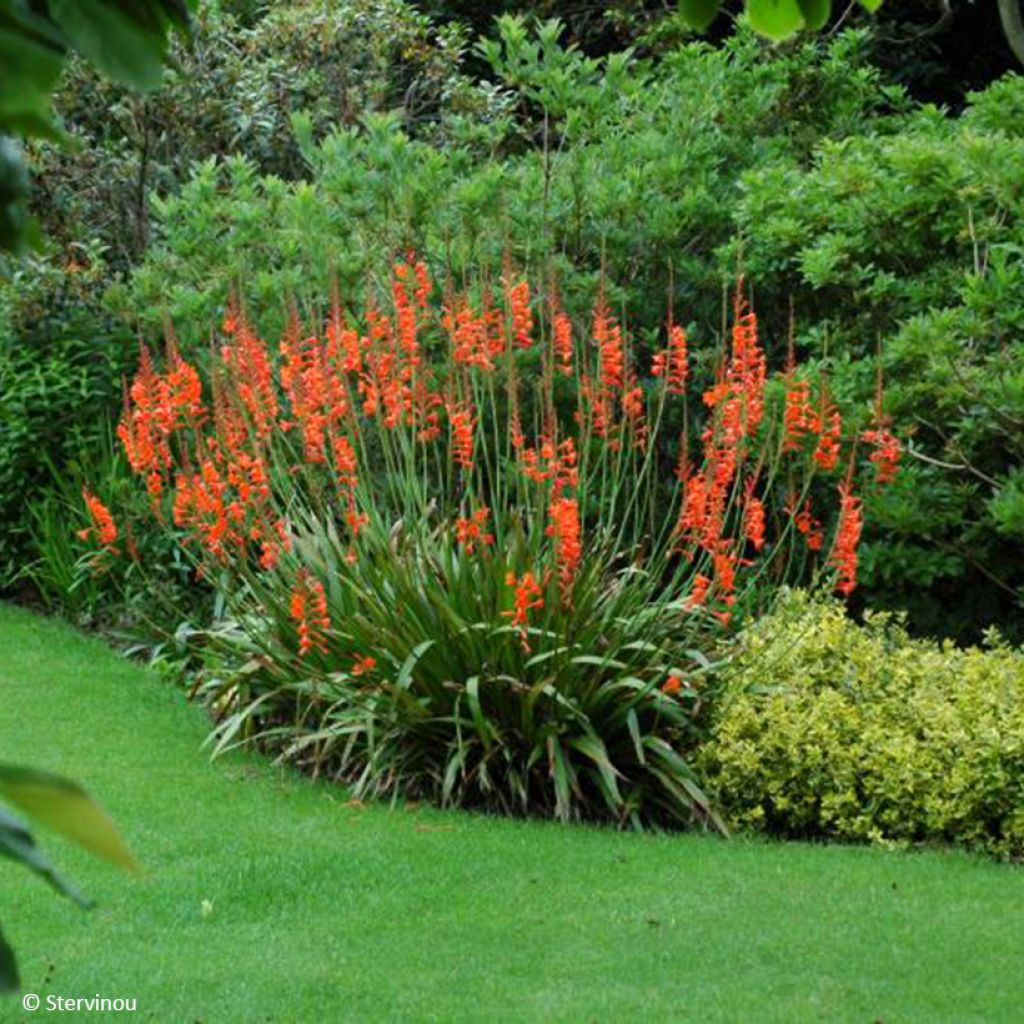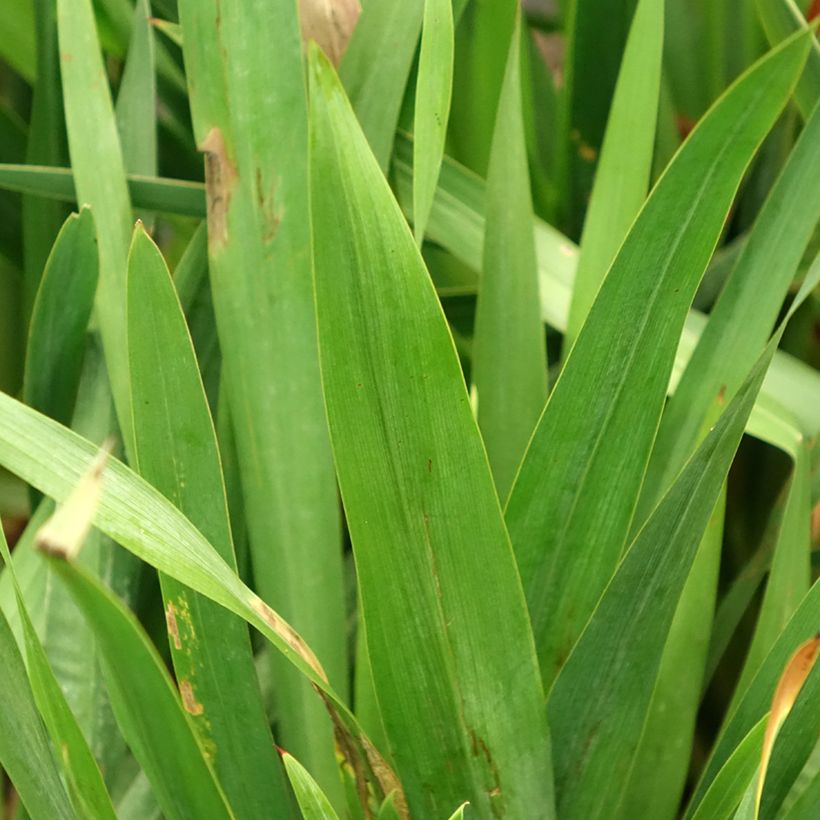

Watsonia Gigantea
Watsonia Gigantea
Watsonia gigantea
Giant Bugle Lily
This item cannot be shipped to the selected country
Delivery charge from €5.90
More information
Schedule delivery date,
and select date in basket
This plant carries a 6 months recovery warranty
More information
We guarantee the quality of our plants for a full growing cycle, and will replace at our expense any plant that fails to recover under normal climatic and planting conditions.
From €5.90 for pickup delivery and €6.90 for home delivery
Express home delivery from €8.90.
Does this plant fit my garden?
Set up your Plantfit profile →
Description
Watsonia Gigantea forms a cluster of light green, sword-shaped leaves, reaching 50 to 80 cm in length and height. This bulbous perennial plant forms flower stalks that rise well above the foliage, up to 1.5 to 2 m high. The flowering resembles that of gladioli but lighter and taller. The orange-red flowers usually appear in late spring. The flowering period varies from region to region. It is easy to grow in a pot everywhere but only plant it in the ground in mild climates.
From the Iridaceae family, like Crocosmias and Gladioli, Watsonia Gigantea is a corm native to South Africa and Madagascar. It is a winter-growing plant in its native region. The giant Watsonia forms a cluster of light green, shiny, slender, long, and upright leaves like those of gladioli. The cluster reaches 80 cm in all directions. In June-July, graceful clusters of orange-red flowers rise to almost 1.5 to 2 m in height. They are tubular, measure 3 to 4 cm in length and have 6 tepals. About ten flowers are distributed on either side of each branched flower stem.
This tender plant is easily cultivated in a pot. In the mildest regions, it can be grown in the ground. This is also possible in cold climates, provided that the corms are dug up when the foliage has turned yellow and stored in a frost-free place. You can replant them the following spring. Watsonia Gigantea will create architectural and exotic compositions by associating it with Carex oshimensis 'Everillo' with bright green foliage, a few clumps of Kniphofia 'Pineapple Popsicle' with cream-yellow flowers and Crocosmia 'Columbus' with orange-yellow flowers.
Report an error about the product description
Watsonia Gigantea in pictures


Plant habit
Flowering
Foliage
Botanical data
Watsonia
gigantea
Iridaceae
Giant Bugle Lily
South Africa
Planting and care
Watsonia Gigantea thrives in the sun or possibly in partial shade in the south. It appreciates rich soil, remaining moist in summer, but well-drained. It dislikes limestone, wet or heavy soils and tolerates wind well. This non-hardy corm (to -6°C) is ideal in mild climates. Everywhere else, plant it in a pot so that it can easily be stored in a greenhouse or conservatory during the winter. You can also dig up the bulbs once the foliage has turned yellow and store them in a box filled with compost in a dry and frost-free place until the following spring. Even in mild climates, protect the crown with a good layer of dead leaves (about 30 cm). When planting, add sand and well-rotted manure and bury the bulbs at a depth of 10-12 cm. Apply compost and a low-nitrogen fertiliser every year in spring. Keep the substrate moist throughout the growing season. After 4 to 5 years you can divide the clump.
Planting period
Intended location
Care
This item has not been reviewed yet - be the first to leave a review about it.
Haven't found what you were looking for?
Hardiness is the lowest winter temperature a plant can endure without suffering serious damage or even dying. However, hardiness is affected by location (a sheltered area, such as a patio), protection (winter cover) and soil type (hardiness is improved by well-drained soil).

Photo Sharing Terms & Conditions
In order to encourage gardeners to interact and share their experiences, Promesse de fleurs offers various media enabling content to be uploaded onto its Site - in particular via the ‘Photo sharing’ module.
The User agrees to refrain from:
- Posting any content that is illegal, prejudicial, insulting, racist, inciteful to hatred, revisionist, contrary to public decency, that infringes on privacy or on the privacy rights of third parties, in particular the publicity rights of persons and goods, intellectual property rights, or the right to privacy.
- Submitting content on behalf of a third party;
- Impersonate the identity of a third party and/or publish any personal information about a third party;
In general, the User undertakes to refrain from any unethical behaviour.
All Content (in particular text, comments, files, images, photos, videos, creative works, etc.), which may be subject to property or intellectual property rights, image or other private rights, shall remain the property of the User, subject to the limited rights granted by the terms of the licence granted by Promesse de fleurs as stated below. Users are at liberty to publish or not to publish such Content on the Site, notably via the ‘Photo Sharing’ facility, and accept that this Content shall be made public and freely accessible, notably on the Internet.
Users further acknowledge, undertake to have ,and guarantee that they hold all necessary rights and permissions to publish such material on the Site, in particular with regard to the legislation in force pertaining to any privacy, property, intellectual property, image, or contractual rights, or rights of any other nature. By publishing such Content on the Site, Users acknowledge accepting full liability as publishers of the Content within the meaning of the law, and grant Promesse de fleurs, free of charge, an inclusive, worldwide licence for the said Content for the entire duration of its publication, including all reproduction, representation, up/downloading, displaying, performing, transmission, and storage rights.
Users also grant permission for their name to be linked to the Content and accept that this link may not always be made available.
By engaging in posting material, Users consent to their Content becoming automatically accessible on the Internet, in particular on other sites and/or blogs and/or web pages of the Promesse de fleurs site, including in particular social pages and the Promesse de fleurs catalogue.
Users may secure the removal of entrusted content free of charge by issuing a simple request via our contact form.
The flowering period indicated on our website applies to countries and regions located in USDA zone 8 (France, the United Kingdom, Ireland, the Netherlands, etc.)
It will vary according to where you live:
- In zones 9 to 10 (Italy, Spain, Greece, etc.), flowering will occur about 2 to 4 weeks earlier.
- In zones 6 to 7 (Germany, Poland, Slovenia, and lower mountainous regions), flowering will be delayed by 2 to 3 weeks.
- In zone 5 (Central Europe, Scandinavia), blooming will be delayed by 3 to 5 weeks.
In temperate climates, pruning of spring-flowering shrubs (forsythia, spireas, etc.) should be done just after flowering.
Pruning of summer-flowering shrubs (Indian Lilac, Perovskia, etc.) can be done in winter or spring.
In cold regions as well as with frost-sensitive plants, avoid pruning too early when severe frosts may still occur.
The planting period indicated on our website applies to countries and regions located in USDA zone 8 (France, United Kingdom, Ireland, Netherlands).
It will vary according to where you live:
- In Mediterranean zones (Marseille, Madrid, Milan, etc.), autumn and winter are the best planting periods.
- In continental zones (Strasbourg, Munich, Vienna, etc.), delay planting by 2 to 3 weeks in spring and bring it forward by 2 to 4 weeks in autumn.
- In mountainous regions (the Alps, Pyrenees, Carpathians, etc.), it is best to plant in late spring (May-June) or late summer (August-September).
The harvesting period indicated on our website applies to countries and regions in USDA zone 8 (France, England, Ireland, the Netherlands).
In colder areas (Scandinavia, Poland, Austria...) fruit and vegetable harvests are likely to be delayed by 3-4 weeks.
In warmer areas (Italy, Spain, Greece, etc.), harvesting will probably take place earlier, depending on weather conditions.
The sowing periods indicated on our website apply to countries and regions within USDA Zone 8 (France, UK, Ireland, Netherlands).
In colder areas (Scandinavia, Poland, Austria...), delay any outdoor sowing by 3-4 weeks, or sow under glass.
In warmer climes (Italy, Spain, Greece, etc.), bring outdoor sowing forward by a few weeks.


































